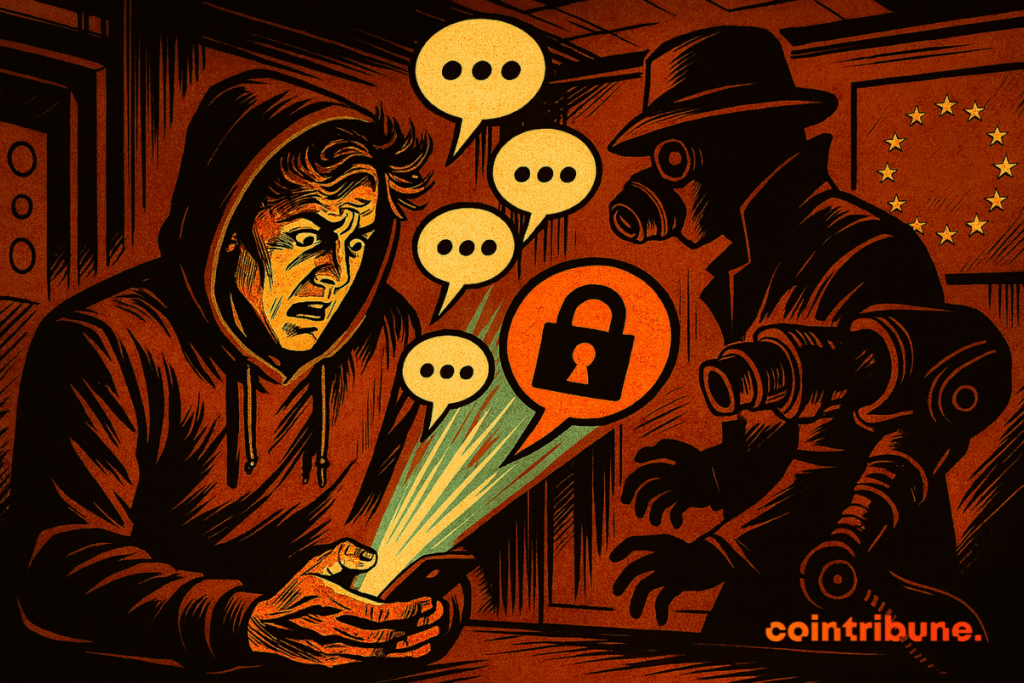Chat Control: A European Law That Could Explode Web3 Usage
Europe loves regulations, sometimes at the expense of innovation. It’s no surprise, then, to see a project like Chat Control emerge, accused of paving the way for massive surveillance. The official promise is the fight against online child sexual abuse, but behind the smoke screen, it is digital privacy that ends up weakened. Fortunately, decentralized alternatives like Web3 are already watching this opportunity to attract millions of wary users.

In Brief
- The Chat Control project imposes scanning of private communications before encryption.
- Experts warn it will weaken digital security and create false positives.
- Web3 appears as the alternative to guarantee users’ privacy.
- Germany holds the key to a decisive vote at the Council of the European Union.
When Chat Control Turns Protection Into Generalized Surveillance
The European text says it wants to protect the most vulnerable. But Chat Control worries more than MiCA: it forces messaging apps to scan all exchanges before encryption. Specifically, even your photos, videos, and links sent on WhatsApp or Signal should be thoroughly checked. Experts talk about “client-side scanning,” surveillance directly on users’ devices.
Hans Rempel, CEO of Diode, does not mince his words:
Giving a corrupted entity almost unlimited visibility into individuals’ private lives is incompatible with any sincere value of the digital world.
That’s not all. More than 400 cryptographers warn that these systems would trigger an unmanageable flood of false positives. In trying to protect, everyone risks becoming vulnerable.
Web3, the Announced Refuge Against Control Abuses
Every breach of classical encryption gives wings to Web3. In this universe, the rule is simple: data remains in the user’s hands, encrypted by default and supported by open protocols. No central servers to intercept or analyze.
Elisenda Fabrega, lawyer at Brickken, reminds us that:
Encryption is more than a technical function. It is a promise made to users that their communications will remain confidential.
If Chat Control passes, privacy-conscious users will look elsewhere. Decentralized alternatives — Web 3.0 messaging apps, wallets with integrated communication, censorship-resistant networks — will become refuges.
For some, this shift is not just a technical trend but a real cultural battle. Because choosing Web3 is also saying no to a Europe tempted by mass surveillance.
Germany as Arbitrator, Europe in Contradiction
Politically, the file divides. Fifteen states, including France, Italy, and Spain, support Chat Control. But about ten others firmly oppose it: Germany, Luxembourg, Austria, the Netherlands, Finland, Poland… Yet, the key is indeed in Berlin’s hands: with its 83 million inhabitants, Germany can tip the balance at the EU Council.
This tug-of-war reveals a European contradiction. Officially, the EU claims to protect privacy and ethical digital life. However, with this text, it could become the pioneer of mass surveillance.
Some Key Figures and Highlights
- 15 EU countries already support the Chat Control project;
- 9 countries, including Germany and Poland, declare themselves opposed;
- 4 states are still undecided: Estonia, Greece, Romania, Slovenia;
- More than 400 cryptography researchers have signed a warning letter.
Behind these figures lies an ideological battle: open innovation versus state control. The Chat Control affair is just another episode in the tensions between European governments and digital actors. Recently, we saw this with Telegram, whose founder was arrested in France. The message is clear: it’s better to leave France than to give in on encryption. The coming months will tell if Europe chooses security… or surveillance.
Maximize your Cointribune experience with our "Read to Earn" program! For every article you read, earn points and access exclusive rewards. Sign up now and start earning benefits.
La révolution blockchain et crypto est en marche ! Et le jour où les impacts se feront ressentir sur l’économie la plus vulnérable de ce Monde, contre toute espérance, je dirai que j’y étais pour quelque chose
The views, thoughts, and opinions expressed in this article belong solely to the author, and should not be taken as investment advice. Do your own research before taking any investment decisions.